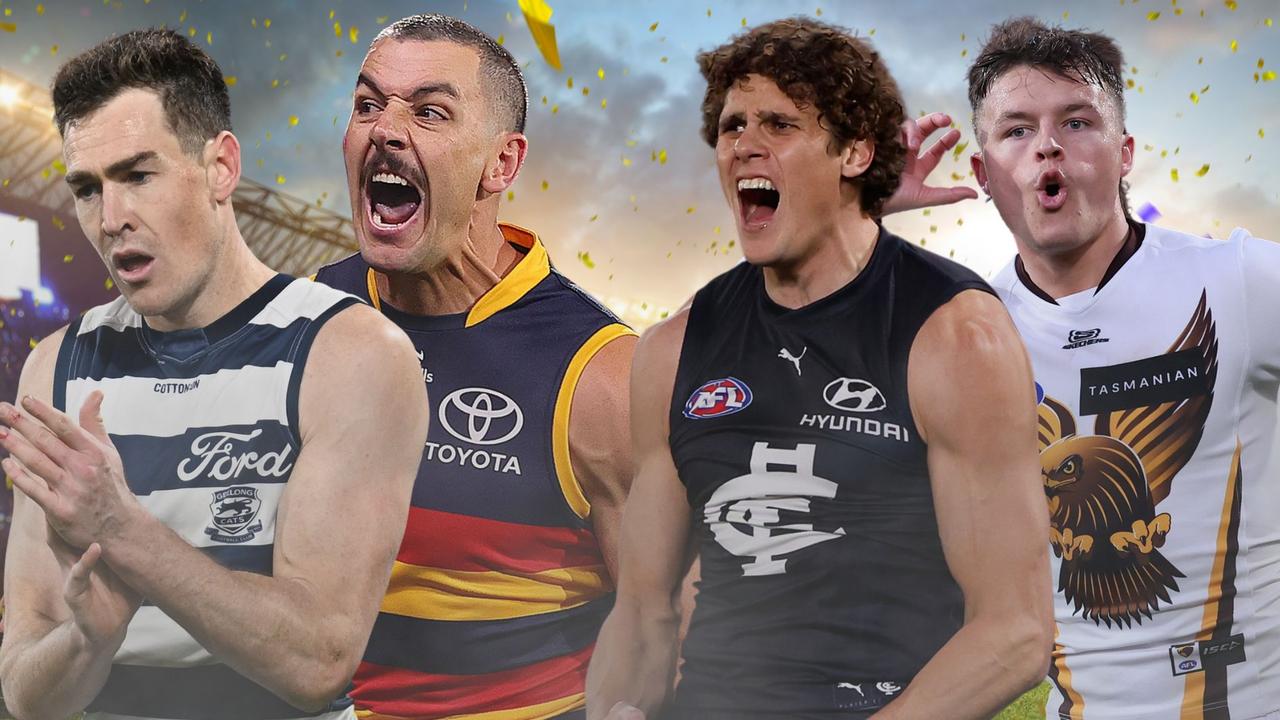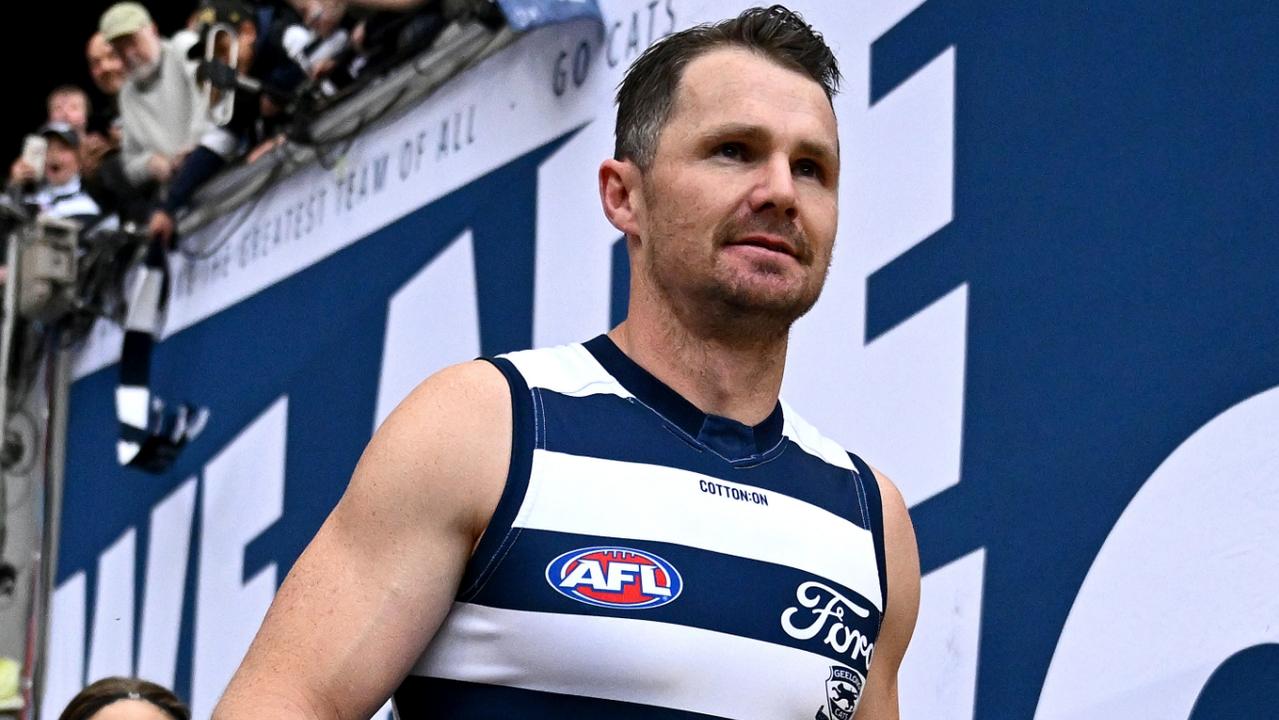Joel Wilkinson details disgust over blackface photos and ‘offensive’ email
The AFL and two players who dressed in blackface at a Gold Coast event in 2013 have apologised, amid anger over a letter from league lawyers contesting a complaint from their African teammate Joel Wilkinson.
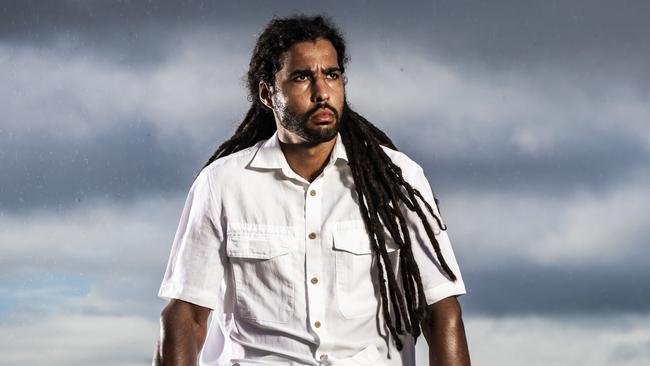
AFL News
Don't miss out on the headlines from AFL News. Followed categories will be added to My News.
A fresh footy racism storm has erupted, with the emergence of photographs showing two white players dressed in blackface at a club celebration, as well as a letter from AFL lawyers contesting an African teammate’s complaint.
The AFL and the two players issued formal apologies over the blackface incident to former Gold Coast Suns player Joel Wilkinson on Friday.
Wilkinson released the documents to the Herald Sun, because he said the AFL industry and legal process had failed to appropriately address his concerns regarding racism during an Australian Human Rights Commission case which ran from 2018 to November 2019.
The photographs show then-teammates Leigh Osborne and Alex Sexton painted with black faces at a Wacky Wednesday end-of-season event in 2013.
SCROLL DOWN TO READ THE FULL STATEMENTS FROM THE AFL, GOLD COAST AND LEIGH OSBORNE
The legal letter from the AFL, sent to Wilkinson during the commission case, targeted him for celebrating his African culture rather than addressing his claims of institutional racism in the league, he said.
At the 2013 event, Osborne was imitating Wilkinson, of Nigerian descent, while Sexton was portraying an indigenous teammate.
Wilkinson said that when Osborne flagged that he planned to dress up as him at the function, he was very reluctant for him to do so.
Wilkinson said he was assured by Osborne that he only intended to impersonate his professionalism at training and ability in the gym, referencing he’d carry a water bottle and wear compression shorts and ankle tape, items Wilkinson always kept on him.
Wilkinson made it clear to Osborne, “don’t make a mockery of me”, he said.
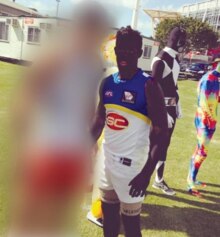
At the event, Osborne wore Wilkinson’s jumper, protruding white ankle straps and tights with Wilkinson’s name and the word protein written in black ink on them, and carried a water bottle.
And he painted his face and body black.
Compounding the offence, Sexton — who is still playing for the Suns — donned the blackface as he portrayed an indigenous teammate.
Wilkinson said he would never forget how bad he felt.
“When I arrived I saw him and another teammate in black paint, I was mortified and so angry I couldn’t believe he came in black paint. The only people who showed any type of remorse were the indigenous players in the team,” he said.
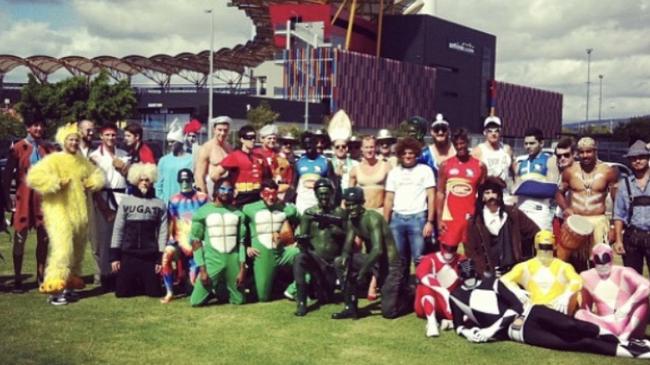
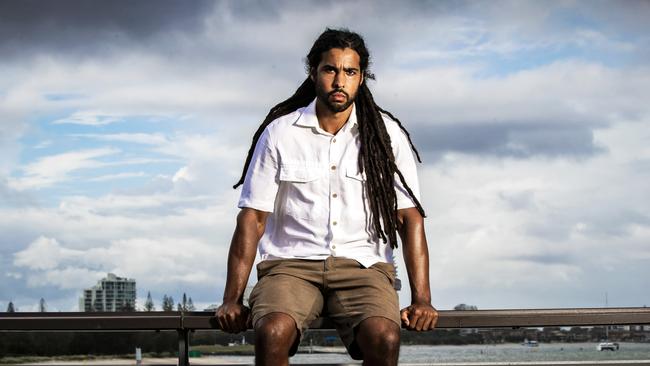
“I tried to stop it during the event, I thought when we returned from the event they would be held accountable by the club, the Gold Coast Suns, but nothing happened to my dismay.
“It very much was a representation of my whole career in the AFL and how they never cared or put in place the systems to protect my wellbeing against racism.”
But he also said he never imagined that the insult would get worse, when his decision to dress and celebrate his culture on the day would five years later be used by AFL lawyers in what he said was a bid to discredit his claims of racial discrimination.
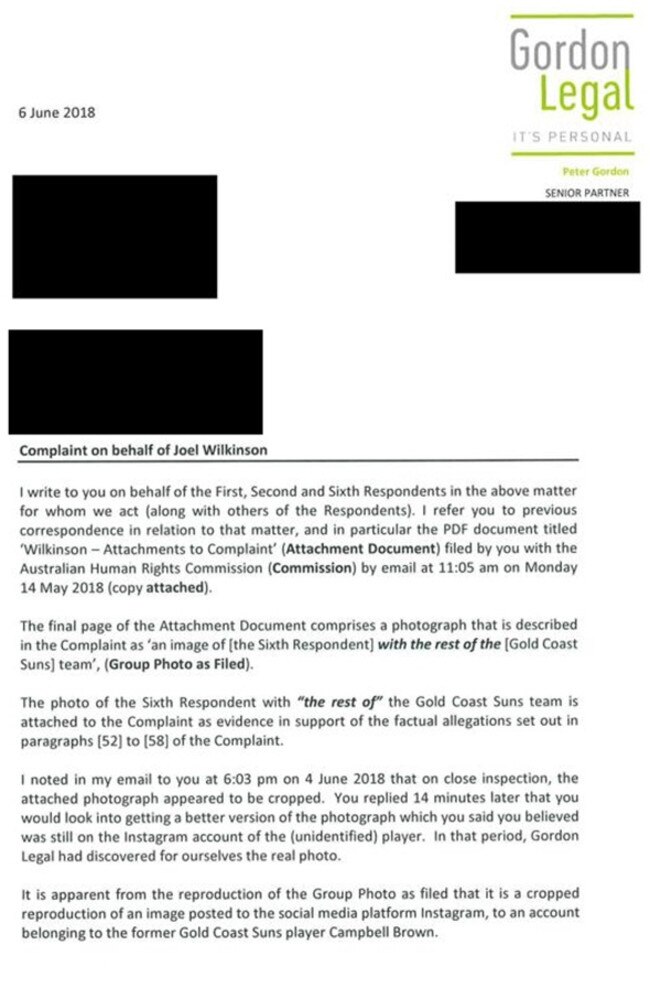
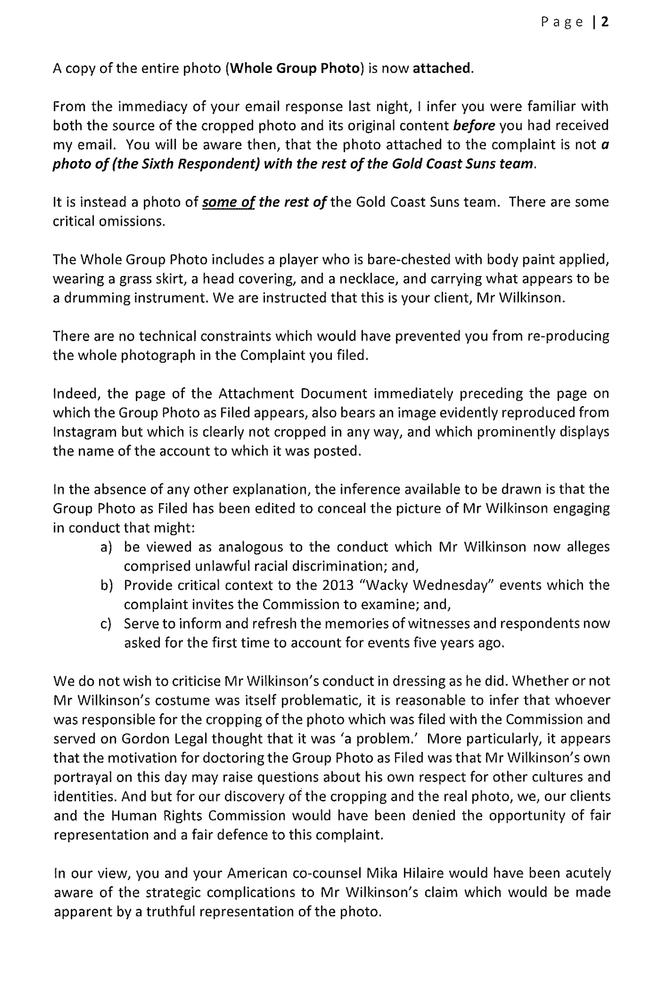
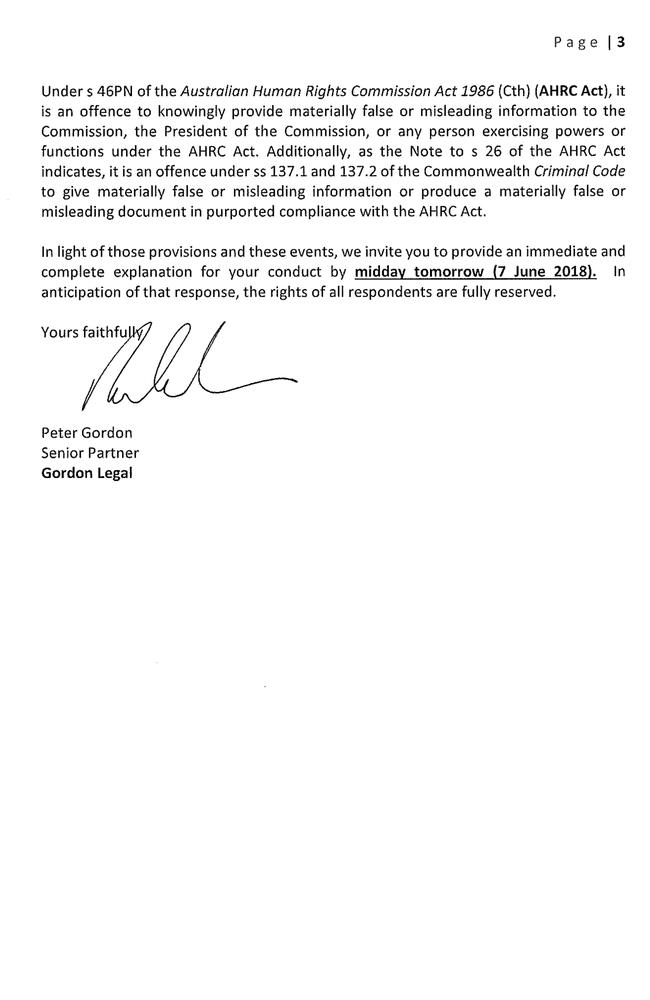
Wilkinson said he originally reported the incident and the other alleged racism he faced from the AFL industry during and after his career to the AFL and the AFL Players Association over the summer of 2013 to 2014, and for several years after. And he said he reported the all racial incidents to the Suns throughout his career.
“And no one did anything about it or the other incidents, the photo was still online until late last year and accessible on social media to anyone,’’ he said.
Wilkinson filed a lawsuit in May 2018 against the AFL, the Suns and six other AFL teams, and four individuals, for racial discrimination, racially-aggravated sexual abuse and religious vilification.
He said this included “racism from players and staff, fans which was covered up, teams and recruiters when I was seeking employment and more, and clearly the blackface”.
When he lodged his complaint the AFL made its position clear regarding the blackface incident, he said.
Lawyer Peter Gordon had been asked by AFL boss Gillon McLachlan to represent the league and the clubs. Gordon was the President of the Western Bulldogs, a team in the lawsuit at the time the proceedings were initiated.
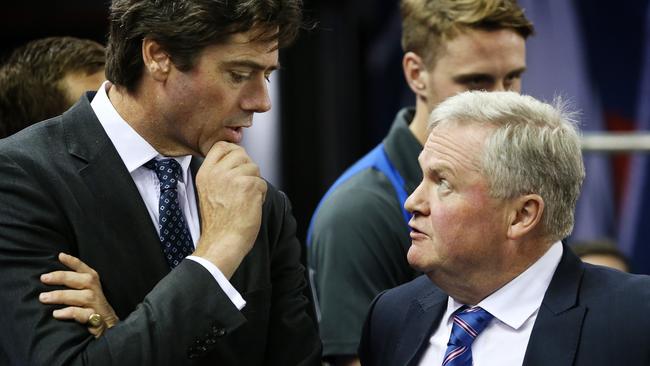
Gordon in an interview with ABC grandstand the day after Wilkinson announced proceedings said: “I took a call from Gillon McLachlan after Joel Wilkinson had announced he’d wished to take those proceedings in the human right’s commission … it’s not a case I would ordinarily do, I guess. So I did reflect on it for a couple of days. I like to think after 40 years in the law I’ve got the option of choosing to take cases against the criteria and what’s for the greater good, and I see this as just that sort of opportunity.”
And on June 6, 2018, Gordon sent an email targeting Wilkinson and his lawyers for cropping himself — celebrating his African culture — out of the image presented to the commission.
It noted Wilkinson’s appearance as “bare-chested, with body paint applied, wearing a grass skirt, a head covering and a necklace, and carrying what appears to be a drumming instrument”.
And it asserted “the inference available to be drawn is that the Group Photo as filed has been edited to conceal the picture of Mr Wilkinson engaging in conduct that might: a) be viewed as analogous to the conduct which Mr Wilkinson now alleges comprised unlawful racial discrimination …’’.
“Analogous’’ means similar or comparable to.
The email went on to say: “It appears that the motivation for doctoring the Group Photo as filed was that Mr Wilkinson’s own portrayal on this day may raise questions about his own respect for other cultures and identities.”
It also warned it was an offence, under the human rights commission act to “knowingly provide materially false or misleading information” and warned that the respondents in the case were reserving their rights.
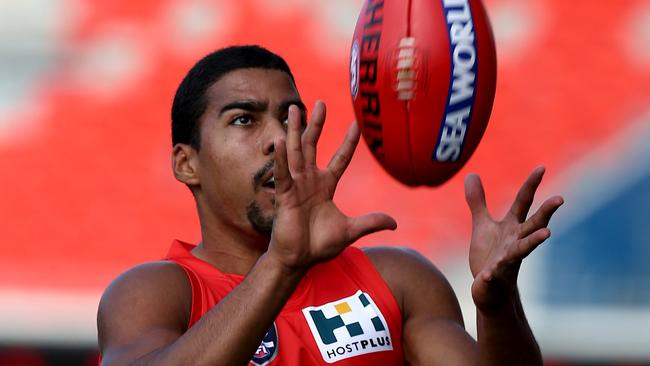
Regarding the motivation for cropping the picture, Wilkinson said it was done to identify the players concerned: “The photo was to show and prove the blackface. There were other players including white players who also weren’t in the photo, did they say anything about them? No”.
Wilkinson said he could not believe that his decision to celebrate his culture could be deemed the same as two white players painting their faces and bodies to mimic him and other black players.
“Just look at the photos. The fact there is undeniable evidence this happened,” he said.
“It speaks to how they view me as an African descendant and black people globally when we be who we are.
“Indigenous players the year earlier celebrated their culture at the same end of year celebrations, so the AFL is also degrading them.
“What’s dangerous is they speak of embracing black people and other cultures, but this is how they view us if we represent who we are.
“So to bring in a young black person celebrating who he is, to then try to use that as an excuse for the racism and to justify the racism is mortifying, clearly they think I’m just a little negro, and how dare I stand up to them.
“What process and policies in the AFL industry allow this conduct to occur.”
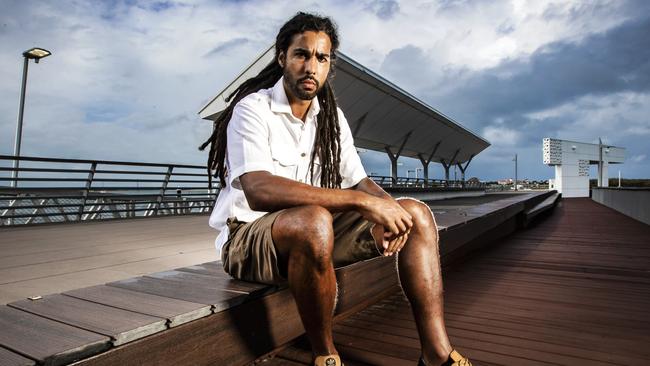
He also argued the actions in effectively seeking to discredit him were significantly worse than Eddie McGuire’s series of gaffes.
He said he was deeply offended by the suggestion he was attempting to mislead the commission or that he had been disrespectful to other cultures.
“To attempt to move the goalposts and come up with disgusting allegations, false allegations in that email regarding blackface racism, it’s horrific and why should they get away with it?”
“Based on the AFL’s conduct it’s very clear to me that the anti-racism campaigns they champion are just a public relations exercise. But under the guise of confidentiality and privilege, you really start to see their true intentions and cultural attitudes and biases towards issues of race.”
Wilkinson, who played 26 games for the Suns between 2011 and 2013 before being delisted, ultimately withdrew his complaint in 2019.
“I removed myself due to the blatant conflict of interest, and continued racial abuse with no accountability, they abused their power and I had reasonable grounds to believe that they were trying to force me into a settlement with myself bound to an NDA, but other parties not,” he said.
“That would have effectively silenced me forever and we’d never know of incidents like this blackface and the letter, while they continued to lie publicly about their great racial relations. I’ve been told that when I removed myself from the commission the case had been running for much longer than the average. This was problematic.”
McLachlan has been strident in calling out racism in recent years.
On June 7, 2019, discussing the racism directed at Adam Goodes, McLachlan said: “I hope that we’ve learned and we understand, I hope that we look at the hurt that Adam went through and that systemic nature of it, that our game and our people are to see that earlier and quicker.”
And on August 19, 2020, McLachlan stated: “Our message is clear, if you are going (to) post racist comments online at our players, then there is no place in football for you.”
But Wilkinson said: “Gillon oversees the AFL and makes the decisions so these individuals can continue to perpetuate racism. His lawyer sent an email about me being African and comparing it to blackface.”
Wilkinson added he would not stop fighting against racism in the game.
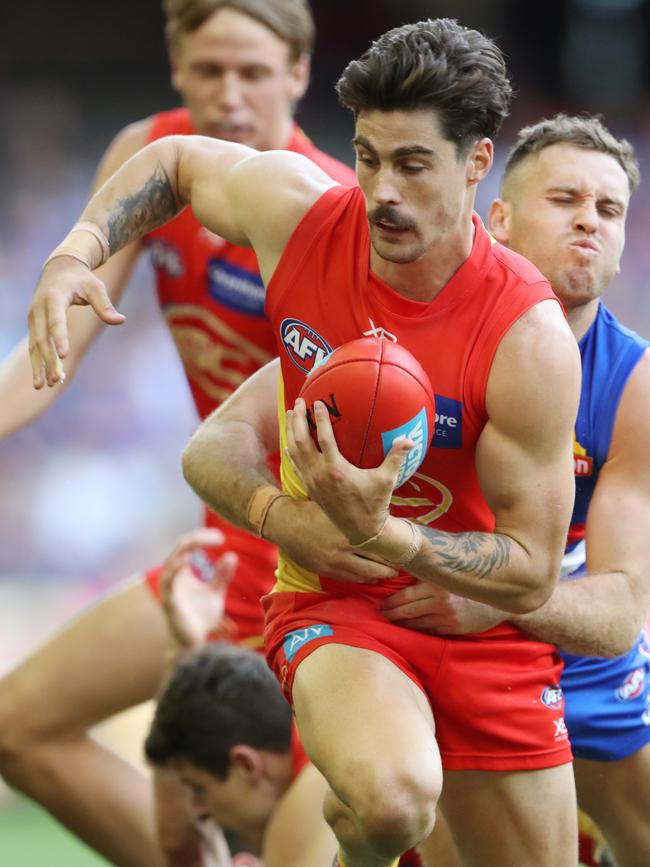
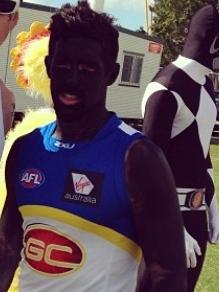
Asked why he was speaking out now, Wilkinson said: “I have been for 10 years. Even over the past year, I reported this to many in and outside of the AFL industry, but as you can see with the Collingwood report, there’s institutional racism within the AFL preventing justice. Just read that letter regarding blackface and see what they tried to do. Can you see what I’ve been up against?”
“You can’t fix something you haven’t recognised or acknowledged and continue to dismiss. Any other industry there’d be consequences. To date, there has been no substantial sanction, and no meaningful structural and or policy changes that have been made to address the deep rooted racial issues that exist within the AFL. Is the larger society, including sponsors, ready to acknowledge and address issues related to racism?”
The AFL said in a statement on Friday: “The AFL is clear that any use of blackface is never acceptable in any forum or at any time. While the AFL was not aware of the 2013 end-of-season blackface incident until 2018 shortly before Joel detailed the incident in his complaint to the Human Rights Commission, one thing that is clear is that the behaviour is wrong and is behaviour that we would never accept or condone.
“Again, we understand the impact this has had on Joel. We are sorry that it happened, and it shouldn’t have.”
Osborne said in a statement on Friday that he had sought permission to dress as Wilkinson, adding “the first time I became aware that Joel was upset about what I did was when I found out about his complaint … in 2018.”
“As soon as I found out about it, I contacted him and apologised to him for my actions and said I was sorry for what I had done in 2013. I never meant to hurt or ridicule him but looking back now I understand it was wrong.”
A Suns statement said Sexton and his former teammate Tim Sumner, who is indigenous, had agreed to dress up as each other, with Sumner painting Sexton’s face and skin black and Sexton painting Sumners’ face and skin white.
But the Suns added “Sexton today said he was sorry for what had happened in 2013”.
“The Suns view the choice of outfits in the photo and on that day to be inappropriate, unacceptable and regrettable,” the statement said.
Gordon said he stood by the legal letter, pointing out that it included a line saying “we do not wish to criticise Mr Wilkinson’s conduct in dressing as he did”.
But he said as Osborne’s lawyer he felt obliged to ensure the uncropped photograph was presented to provide full context, given he had been accused of racial hatred.
“I feel I was misled by the photo cropping as to the true nature of the evidence and I believe the HRC was too,” he said.
He added: “None of that of course is to excuse the blackface incident — it should not have happened then and it should never happen again.”
AFL STATEMENT ON JOEL WILKINSON
The AFL is committed to continuing the fight against racism in our sport and to continuously improving our processes to deal with discrimination of any kind.
Racism is not, and never will be, acceptable in our game and there are no circumstances where racism can be allowed to go unchecked.
We regret that any person suffers racism in our game.
We acknowledge and understand the impact that racism had on Joel Wilkinson during the course of his AFL career, including a number of serious incidents including where Joel was vilified by an opposition player who was later suspended for six weeks and fined under the AFL’s vilification rules.
A separate incident where Joel was racially abused by a supporter in the crowd was also investigated by the AFL.
We regret that Joel suffered racism in these incidents and acknowledge the hurt caused to him.
The AFL is clear that any use of blackface is never acceptable in any forum or at any time. While the AFL was not aware of the 2013 end-of-season blackface incident until 2018 shortly before Joel detailed the incident in his complaint to the Human Rights Commission, one thing that is clear is that the behaviour is wrong and is behaviour that we would never accept or condone.
Again, we understand the impact this has had on Joel. We are sorry that it happened, and it shouldn’t have.
We have taken serious and genuine steps to address racism in our game and to listen and to learn from people in our game and the experiences they have had and we will continue to do so.
While Joel’s complaint against the AFL, a number of clubs and players was terminated by the HRC in December 2019 with a number of serious allegations either withdrawn or dismissed, the AFL has always made clear it remains open to talking to Joel and to learn from his experiences.
In 2014 the AFL had worked with Joel to produce a video detailing his experiences with racism and its impact on him that was used to educate young players.
That remains on the AFL website today.
The AFL retained Peter Gordon of Gordon Legal to represent the AFL and all other parties in the HRC case because of Peter’s unparalleled reputation as a first-class lawyer and for his fairness and integrity in matters of discrimination.
Whilst acting for the AFL and the other parties he acted on the instructions of the AFL General Counsel and those other parties.
The AFL deeply regrets that we have not been able to resolve this matter to date.
We want all people to be able to belong and feel welcome in our game at all times and we will strive to end racism and discrimination that exists at any level of our game. We will continue to work hard to ensure we have behaviours, actions, programs, processes and beliefs in place that support a safe environment for all.
STATEMENT FROM PETER GORDON
It is important for me to first state that in the course of this case, I have been deeply saddened by the racism suffered by Joel Wilkinson during his time in the AFL.
The AFL was first notified of claims by Joel Wilkinson in December 2017 that the AFL and a number of clubs and people in the industry had breached his rights under the Racial Discrimination Act.
This was several years after he had left the football industry.
There were negotiations between his lawyers and the AFL’s in-house lawyers for six months before he announced in a press conference that he would prosecute legal claims in the Human Rights commission (‘the HRC”).
I was first approached by the AFL in late May 2018 to defend it and all the other clubs and people whom Joel accused of breaches of the Act in the case.
I agreed to act for all respondents on the basis we would approach the case fairly and I approached it consonant with the principles which have guided my forty years in the law.
It is important to note that from the first time Joel contacted the AFL about this claim, the AFL acknowledged that he had suffered from racism in his time in the AFL and expressed regret over it.
Racism, especially amongst AFL crowds have been a shameful and perennial feature of the history of our game even into the present decade. I have often acknowledged that and the
history of my own actions while President of the Bulldogs, both in public and within the AFL, demonstrates it. This history is not hard to google search.
The history of racism directed at Joel Wilkinson included a case of vilification of Joel by a Western Bulldogs player Justin Sherman leading to the AFL’s most recent Rule 35 prosecution in 2011. The outcome of that case is a matter of public record.
Other incidents where Joel was racially abused by supporters in crowds — including games at Geelong and the MCG — were also investigated at the time by the AFL and by the clubs concerned.
The AFL supported Joel in those complaints and worked with him in 2014 after his
retirement to produce a video on the impact of racism. That video enabled him to publicly tell his story on a very broad platform.
The video has also been used as part of player training on the impact of racism and the video is still available on the AFL website.
In his HRC complaint against the AFL, Joel also brought allegations against a number of clubs and a number of individuals. In the next several months, as I investigated the complaints, one of them was proven to be false and a number of others were withdrawn by Joel and his lawyers early in the process. I believed a number of the claims which remained would also fail. It is of course important that if people of whatever background are accused of racism, they be entitled to be vindicated when the evidence suggests the claims were false or cannot be proved.
The racism claims which Joel did not abandon then progressed in the Human Rights Commission until they were terminated in October 2019.
Joel then had a statutory period in which to bring his claims in the Federal Court and he chose not to proceed with them.
But as well as the claims which were disproven, withdrawn or bound to fail in my view, there were other claims he made which were disturbing to me, the AFL and the Gold Coast Suns (despite differing accounts of relevant events by different players,) and we sought to learn more about those incidents from Joel.
The 2013 Gold coast Suns end-of-season blackface incident he has now raised publicly was one of those matters.
The AFL did not know about the 2013 blackface incident until early 2018 when Joel brought his claim.
The AFL was shocked by it and would never have condoned or approved it, had it known. The Suns also would not have allowed it or condoned it had they known of it.
As a past AFL club president, I can also say we club administrators always dreaded Mad Mondays as accidents waiting to happen, which is why they are now far more rigidly
controlled than they were in 2013 when they were generally private players functions off- limits to non players, irreverent, and involving dress ups, mockery and drinking to excess.
Leigh Osborne who dressed up as Joel including in blackface on that day has authorised me to release a statement on his behalf.
Five years on, Leigh first found out he was one of the respondents to Joel’s action; being accused by Joel not just of discrimination but also of racial hatred. He said sorry to Joel straightaway.
Joel’s HRC complaint contained a photo of the GCS players including of Leigh dressed in blackface as Joel.
It had been cropped to remove a number of players including Joel in his own costume and participating in the photograph.
For the first three days in which I had the complaint containing only the cropped photo, I thought Leigh’s position was close to hopeless and I was sceptical of his explanation.
Then my office discovered the real photo.
Leigh believed he had Joel’s consent to dress up as him.
He believed they were and remained friends. He says he was never asked to remove the paint by Joel on the day.
He says if he had been, he would have done so immediately and now understands that what he did is wrong and is sorry at the impact his actions have had on Joel.
The two posed happily in the photo and then enjoyed a long day’s drinking. They went to Las Vegas together two weeks later.
As Leigh’s lawyer, I believed the photo … the real one … and all of those contextual matters I just described were important evidence for Leigh, especially on the racial hatred allegation.
The uncropped photo might have been important to corroborate whether Leigh’s behaviour, was merely racially insensitive and ill-informed, or rose to a level of racial hatred.
As to disputed facts between Joel and Leigh about for example, whether Joel repeatedly asked Leigh to wash the paint off, I thought the photo was also relevant.
I feel I was misled by the photo cropping as to the true nature of the evidence and I believe the HRC was too.
I thought the presentation of the complaint in that way was deeply unsatisfactory and so I wrote to Joel’s lawyers complaining about it.
Part of my letter read; We do not wish to criticise Mr Wilkinson’s conduct in dressing as he did.
Whether or not Mr Wilkinson’s costume was itself problematic, it is reasonable to infer that whomever was responsible for the cropping of the photo which was filed with the Commission and served on Gordon Legal thought that it was ‘a problem’.
More particularly, it appears that the motivation for doctoring the Group Photo as filed was that Mr Wilkinson’s own portrayal on this day may raise questions about his own respect for other cultures and identities.
And but for our discovery of the cropping and the real photo, we, our clients and the Human Rights Commission would have been denied the opportunity of fair representation and a fair defence to this complaint.
I stand by that explanation. Before I sent the letter, I consulted about it with Queen’s counsel Jack Rush, (a former Supreme Court Judge,) whose view was that the letter was not only appropriate but a necessary step.
None of that of course is to excuse the blackface incident — it should not have happened then and it should never happen again.
But the context does bear some explanation.
These matters which Leigh’s barristers and I intended to raise might have found favour with a Judge or they might have failed.
But Leigh and the court were entitled to see the real photograph and not a cropped version of it.
This incident was one of a large number of issues which were ventilated in this case before either being abandoned or terminated by the HRC.
STATEMENT FROM LEIGH OSBORNE
Joel Wilkinson was a friend as well as a teammate who I liked and respected.
When I attended the 2013 Mad Monday type event dressed as Joel I did so with the loan of his jumper and with his agreement after I had asked him whether it was okay to dress up as him.
Joel never raised any issue about it with me on the day.
He was pretty strikingly dressed himself and I just thought he went dressed as a native American Indian.
We joked around at the start of the day and we all posed for a photograph.
Then we spent the day drinking … that’s how those Mad Mondays used to go.
A couple of weeks later, Wilko and I went to Las Vegas together for our end-of-season trip. We had a great time in Las Vegas.
Since then, we have seen each other from time to time but he’s never mentioned the Wacky Wednesday event to me.
The first time I became aware that Joel was upset about what I did was when I found out about his complaint to the Human Rights Commission years later in 2018.
As soon as I found out about it, I contacted him and apologised to him for my actions and said I was sorry for what I had done in 2013.
I never meant to hurt or ridicule him but looking back now I understand it was wrong.
I was a pretty young bloke in 2013 and have come to learn a lot more about these things since then and I am sorry to have caused any trouble or hurt and obviously wouldn’t ever do it again.
STATEMENT FROM GOLD COAST SUNS
The Gold Coast Suns acknowledge that Joel Wilkinson experienced racism during his AFL career with the club including two well-publicised on-field incidents. We deeply regret that he did.
The photo released to media is from an end-of-season player dress-up event that occurred in 2013.
In the photo a former Suns player Leigh Osborne dressed up as Wilkinson and we understand Leigh has provided comment on this.
Separately, Alex Sexton and his former Suns teammate and housemate Tim Sumner, who is indigenous, agreed to dress up as each other. This included Sumner painting Sexton’s face and skin black and Sexton painting Sumners’ face and skin white.
The Suns view the choice of outfits in the photo and on that day to be inappropriate, unacceptable and regrettable.
Alex Sexton today said he was sorry for what had happened in 2013.
“At the time I just saw it as two housemates dressing up as each other,” Sexton said.
“Looking back, I regret that decision. While I meant no harm, I certainly accept today that it was inappropriate and I now understand how upsetting and offensive my actions were.”
As a club, the Gold Coast Suns strongly support the fight to stamp out racism and we will continue to embrace the work we do with multicultural, Aboriginal and Torres Strait Islander organisations.
The Suns have a number of strong indigenous and multicultural role-models and we are committed to having an inclusive and respectful environment.
Originally published as Joel Wilkinson details disgust over blackface photos and ‘offensive’ email

